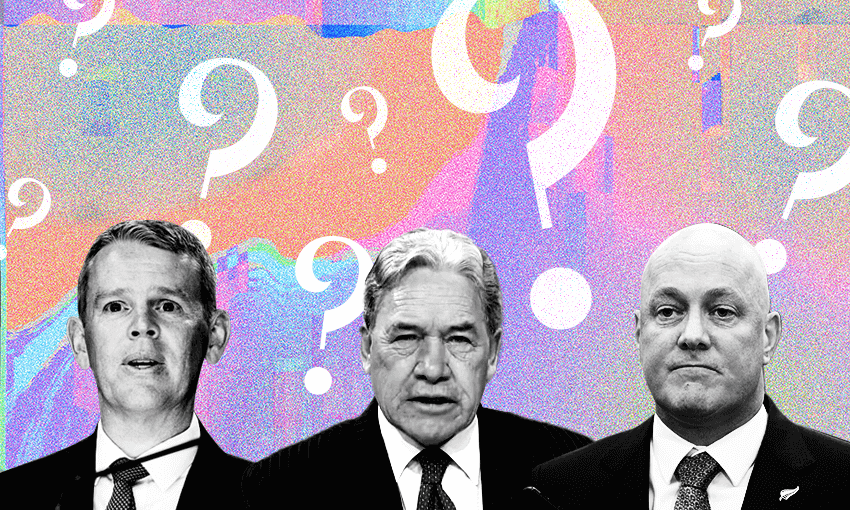OK, there were a couple of winners if you looked really hard.
In a perfect echo of the psychic state of the nation, last night’s eagerly awaited poll by Verian for 1News, coming precisely a year since the last election, delivered collectively to the political actors of New Zealand the excitement of a slow leak in a neglected inflatable toy. Somehow, everybody seemed to be a loser.
Loser: the mojo
In the lead-up to the election, Christopher Luxon diagnosed a malaise: New Zealand had become negative, wet, whiny and inward-looking and, more to the point, urgently needed to “get our mojo back”.
Disappointingly, the new 1News/Verian poll did not ask people for their status vis a vis negativity, wetness, whine or inward gaze, nor, alas, where they would place themselves on the mojo meter. It did, however, ask what sort of shape respondents felt the country was in. Only 30% thought the country in better shape than a year ago, with 26% saying there was no difference. Forty per cent, meanwhile, reckoned the country was in worse shape than before the election.
Loser: The coalition government
To be clear, if this week’s poll was mapped into an election result, the existing coalition would be returned to power – which is no small achievement given the unprecedented nature of the three-legged machine. At the same time, the combined Nat-Act-NZF vote was 52.8% at the election; this poll has it at 50%, as the chart above shows.
And, yes, this poll would give the coalition 63 seats. But that's more fragile than it appears. If, for argument’s sake, NZ First returned 4.99% support, falling a cigarette paper under the threshold (and if they didn’t win an electorate seat, while TPM did), we’d have a dead heat. NZ First would be out of parliament, with National and Act winning 60 of 120 seats.
Loser: Christopher Luxon
When only one in four voters picks you as preferred PM a year after the election, something isn’t right. To be fair to Luxon, the credit for maintaining the coherence and basic civility in a coalition with two leaders who for some time seemed to want to rip the livers from one another’s chests must go to him – that’s quite an HR job. John Key, from whom Luxon gains in mentorship but suffers in comparison, did, remember, have the advantage of leading minority governments rather than full coalitions, with a consistent mix of support parties outside cabinet but considerably greater autonomy.
But still, when it comes to his public appearances Luxon has manifestly failed to find his groove – the talking points and irritability are conspicuous.
Loser: Chris Hipkins
The other Chris is even less loved. That there isn’t a broiling storyline about the vulnerability of his leadership is only because there is no apparent appetite for the job from any of his caucus colleagues. And even if we’re still a long way from an election campaign, 15% for the leader of the opposition is bleak. Hipkins seems so firmly attached to the mantra that oppositions shalt not bark at every passing car he’s quit barking and curled up in the back seat.
Loser: The Labour Party
See above.
Loser: The Greens
The government is unabashedly cutting taxes and public sector jobs, embracing roads, oil and gas, targeting blind frogs called Freddy and flirting with culture wars. It’s hard to imagine a more fertile territory for the Greens, especially when you chuck a pedestrian Labour Party into the mix. In co-leader Chlöe Swarbrick the Greens have one of the country’s most effective communicators; they might be faring better if she weren’t communicating mostly about Darleen Tana.
Loser: Te Pāti Māori
They’ve inched up slightly on their election result, but remain some distance from the threshold at which electorate victories are not essential. In normal circumstances it would be a solid result. These are not normal circumstances – the coalition government has delivered, in the words of the NZ Herald, “a tsunami of policies aimed at Māori”. That has in turn generated a groundswell of pushback and outrage; Te Pāti Māori hasn’t fully harnessed that.
Loser: New Zealand First
Might be a little harsh to put NZ First in this category – 5% is a healthy middle-term result, and they may well have earned a bump from a successful conference over the weekend. Still, 5% is right on the precipice.
Winner: The coalition government
A bob each way here. New Zealand’s most prominent political pundit, David Seymour, made the point to 1News last night: given the economic circumstances, the coalition has done pretty well to hang in there on latest polling. Assuming an economic recovery is imminent, the harvest is there to be reaped. And it could well pan out that way, as long as other factors, whether in social cohesion, say, or rising unemployment, don’t drown it out.
Winner: The Opportunities Party
Top has gone from 1.1% in August to 2.6% today. A veritable (look away, statisticians) surge. The secret sauce: Top has been almost completely invisible lately. This can only be an endorsement of absence. A vindication of nothingness. The party has no leader and that, perhaps, is what the country craves: silence.

